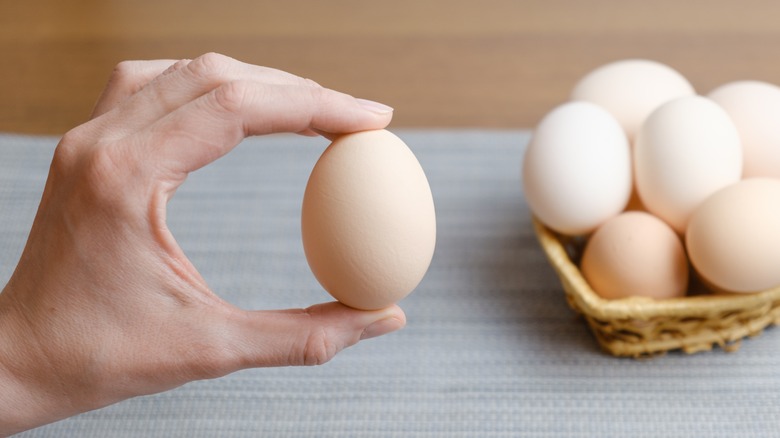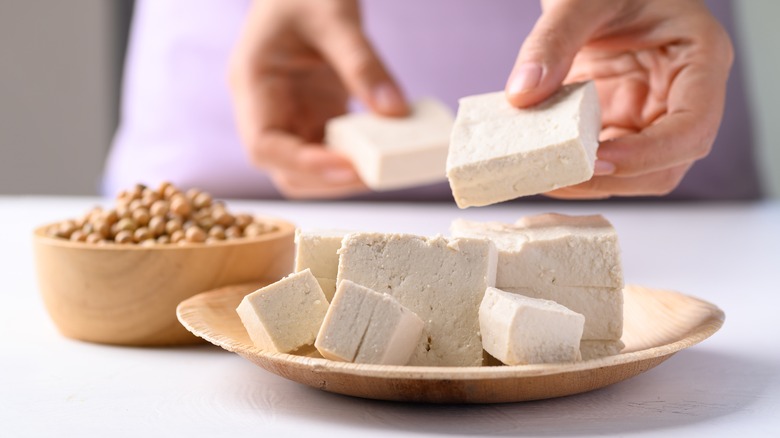Is It Safe To Eat Raw Egg Yolks While Pregnant?
Pregnancy is a delicate time for both the mother and the fetus. If you're pregnant, consuming a balanced and healthy diet is essential to support your health and your baby's development. During this time, your body undergoes significant changes, and proper nutrition can help reduce the risk of complications such as preterm birth, low birth weight, and various other congenital disabilities, per a 2021 study published in the American Journal of Obstetrics and Gynecology.
Pregnant women are at a higher risk of developing complications from foodborne illnesses than the general population, according to the U.S. Food & Drug Administration (FDA). Your doctor might advise avoiding certain foods while pregnant, as eating them can harm the developing fetus. When it comes to consuming eggs during pregnancy, there is some confusion about whether or not it's safe to eat raw egg yolks. Eggs are a nutritious and versatile food containing protein and various vitamins and minerals — they include vitamin D, for instance, and are an excellent source of choline, which is essential for fetal growth and development, says the American Heart Association.
Raw eggs are commonly used in certain dishes such as homemade mayonnaise, salad dressings, and raw cookie dough, or you may just prefer your poached or sunny-side-up eggs to have a runny yolk. But for pregnant women, eggs that aren't fully cooked should be avoided.
Raw eggs are risky for pregnant women to eat
According to Healthline, raw eggs may contain harmful bacteria such as salmonella that can lead to food poisoning, which can be particularly dangerous during pregnancy. According to Kansas State University, 1 in every 20,000 eggs has salmonella.
When an egg is laid, it may contain salmonella on the shell or inside the egg. The bacteria can spread if the egg is not handled properly, per the Centers for Disease Control and Prevention (CDC). If you get food poisoning from salmonella while pregnant, it can infect the amniotic fluid and pass to your baby, per Healthline. Symptoms of food poisoning include diarrhea, fever, and abdominal cramps, and they usually appear within 12 to 72 hours after exposure to the bacteria.
While eggs can be a healthy and nutritious part of a balanced diet, practicing good food safety habits when handling and preparing them is vital. When cooking eggs, pay attention to the consistency of the yolk, ensuring it isn't runny. Hard-boiled eggs are a good choice, as they are easy to prepare and make for a quick and healthy snack. In addition to cooking eggs thoroughly, remember to wash your hands and the surfaces that come in contact with eggs. If you have concerns about consuming eggs during pregnancy or are unsure about the safety of a particular food, it's always best to consult with your doctor for personalized advice.
Alternatives to eggs
Fortunately, several food alternatives to eggs can be consumed during pregnancy. According to Healthline, yogurt is an excellent source of protein and can be used in many recipes that call for eggs. Johns Hopkins Medicine says that yogurt is safe to eat during pregnancy and is a great source of calcium, a vital nutrient for bone development.
Another alternative to eggs is tofu, which is a plant-based protein made from processed soy milk. It is a popular ingredient in vegetarian and vegan cuisine, as it is a good source of protein and can be used in a variety of dishes. Healthline notes that tofu and other soy-based products are generally considered safe during pregnancy, but advises limiting tofu intake to a serving or two.
Chia seeds are another great alternative to eggs. They are high in omega fatty acids, fiber, and protein and can be used as an egg substitute in various recipes. According to Medical News Today, they are also safe to consume during pregnancy and breastfeeding, although the source advises not to eat more than 1 ounce a day in order to avoid intestinal discomfort.



